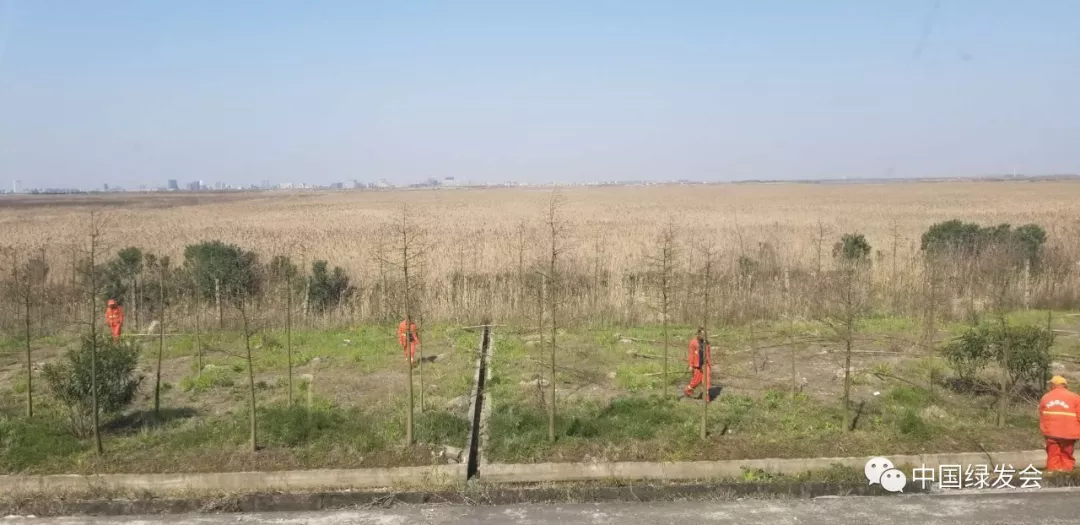On April 2, volunteers in Nanhui, Shanghai, sent pictures of the trees they planted two to three years ago, fearing that many of them had died, and were replanted now.
There is a question: Is Nanhui Dongtan really suitable for planting trees on a large scale? Is this sustainable?
In fact, General Secretary Xi has already emphasized the importance of quality in afforestation. On April 2, 2018, when he participated in the tree planting activities in the capital, General Secretary Xi clearly pointed out: "To carry out land greening, we should pay attention to both quantity and quality, adhere to scientific greening, adjust measures to local conditions, take the road of scientific and ecological, make long-term achievements, constantly expand forest area and improve forest quality, improve ecosystem quality and stability." On January 16, 2019, General Secretary Xi inspected "Millennium Xiulin" (the afforestation area of Daqing River) in Xiongan, emphasizing the importance of approaching nature and innovating afforestation models.
Shanghai also needs to rely on the ecological environment to reflect its value and increase its attractiveness. Nanhui is originally an ecological treasure of Shanghai.
Nanhui Dongtan wetland is a muddy coastal wetland, located in the southeast corner of Shanghai, at the junction of the Yangtze River and Qiantang River. It stretches about 40 kilometers from Pudong Airport to Luchao Port. It mainly consists of reed land within the embankment and other beaches. Wetlands provide a lot of raw materials for our life and production while maintaining ecosystem stability, protecting biodiversity, regulating climate, purifying water, beautifying the environment, reducing natural disasters and etc. They are called "kidney of the earth" and "species gene pool", whose ecological value is far higher than other types of ecological environment. More than 400 species of birds have been found in Nanhui, accounting for about 30% of the total birds in China and 85% of the recorded birds in Shanghai. Such an important habitat provides these birds with a diverse wetland environment, including reeds, shoals, grasslands, woodlands, and beaches. It is an extremely important node for many birds to supplement their food and physical strength during migration.
Once trees are planted on a large scale (single species), there will be a huge disaster for bird habitats. In fact, as early as 2012, thousands of acres of wetland in the core area was transformed into farmland, which greatly reduced the living space of waterfowls. In recent years, these artificially damaged with beautiful names have worsened the situation.
In a recent interview with Southern Weekend, China Biodiversity Conservation and Green Development Foundation expressed concern about this. This year, China has launched a large-scale campaign on land greening, which is very correct and remarkable. It is of great significance to cope with climate change and reduce carbon dioxide. However, we should talk about science. When we plant trees, we should not simply regard "forest" as industrial forest. We should regard it as "planting trees and ecological civilization", "planting trees and protecting nature".
It is not industrialization to designate a greening rate, and then set goals; it is to take the protection of nature as the core; it is the core to build and advocate eco-civilization.
About China's large-scale greening, we must understand its spiritual essence. This "greening" refers to the restoration of nature, the protection of nature and biodiversity under the guidance of ecological civilization. This is the core of land greening. Respect nature. To plant trees, we should ask birds; not only birds but also butterflies and animals. According to the law of nature, we should not simply understand it from human beings, the keyword is "nature".
In the name of planting trees and ecology, the planting of ten thousand acre trees at Dongtan of Nanhui in Shanghai has destroyed the ecology. Nanhui planted so many trees. Within a few years, the trees died again. Should we not rethink this simple industrialized tree planting movement?
This kind of "pseudo-ecological engineering" is not an example. Some places do not understand the core meaning of ecological civilization, and the proportion of such pseudo-ecological engineering is not low. In fact, this is a debate between "industrial civilization" and "ecological civilization". It is simple to replace "green development" with "planting trees". We should grasp the core of ecological civilization and earnestly study the thought of ecological civilization. We should not only focus on the surface of greening, but also achieve the greening coverage index regardless of its original ecosystem.
Shanghai Nanhui East Beach is located in the Yangtze Estuary, which is part of the ecological environment of the Yangtze River. It is urgent to protect this area. On March 25, Han Zheng, Committee Member of the Political Bureau of the CPC Central Committee, Vice Premier of the State Council and Head of the Leading Group for Promoting the Development of the Yangtze River Economic Belt, attended the seminar on promoting the development of the Economic of Yangtze River. In his speech, he stressed that the important guiding spirit of General Secretary Xi to protect and not develop the Yangtze River Economic Belt, which should be firmly implemented. All economic activities involving the Yangtze River should be based on the premise of not destroying the ecological environment. The protection of the ecological environment should impel the development of high quality, so as to find a way of green, ecological and sustainable development.
The CBCGDF recommends that Shanghai immediately stop large-scale afforestation in Nanhui Dongtan. In the planning of Shanghai, we should balance the relationship between development and ecological protection, jump out of the thinking of equating "planting trees" with "green development", and truly practice ecological civilization. It is expected to promote the sustainable development of Nanhui Dongtan wetland by protecting its ecological environment and make do contributions to the conservation of biodiversity.


(Photo credit: local volunteers)
Original Chinese article:
http://www.cbcgdf.org/NewsShow/4854/8188.html
By / Li Xue
